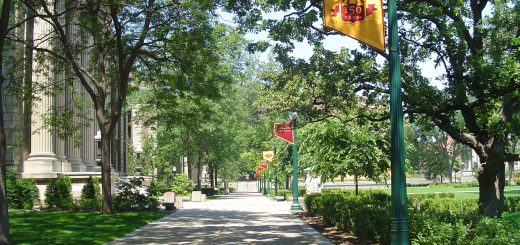Undocumented means nontraditional
Financial needs, family obligations and immigration status can impede four-year degree finish.
By: Grace O’Neil
Undocumented immigrant students are eligible for in-state tuition for eight semesters through the Minnesota Dream Act.
But eight semesters may not be enough time for undocumented students to graduate because they often need more than the usual four years, said Marissa Hill-Dongre, director of the University of Minnesota’s Immigration Response Team.
Immigrant students have a unique set of concerns — including financial obligations,
immigration status and caregiving responsibilities — that make being a full-time student difficult. According to Hill-Dongre, immigrants tend to be in the category of nontraditional at much higher rates than other students.
The Minnesota Legislature passed the Minnesota Dream Act, otherwise known as the Prosperity Act, in May 2013. The act gives in-state tuition at public colleges and universities and
provides financial aid from public and private sources to undocumented students who graduated from a Minnesota high school.
Currently, there are 7,000 undocumented students between the ages of 18 to 24 in Minnesota postsecondary schools, which is 34 percent of Minnesota’s undocumented population in that age range, according to the Migration Police Institute.
“For many of them, it’s [be] a nontraditional student or don’t be a student at all,” Hill-Dongre said. She works with many students who must go part-time due to finances and caregiver responsibilities. These students struggle because they risk being ineligible for in-state tuition after the traditional eight semesters.
The University of Minnesota defines a nontraditional college student as a student who has delayed enrollment, is enrolled part time, works full time, is a student parent or does not
have a high school diploma.
Due to the financial stress many immigrant students face, some undocumented students use the Deferred Action for Childhood Arrivals (DACA) program to work on-campus jobs to fund
their education. Many of these students are fearful of losing their jobs or possibly being deported due to the Supreme Court’s upcoming decision on whether DACA will continue to
exist.
Fifty-six percent of DACA recipients reported they think about either being detained in an
immigration detention facility or deported from the United States at least once a day, according
to the annual survey of DACA recipients by the U.S. Immigration Policy Center at the University
of California, San Diego.
The United States Supreme Court heard oral arguments last November, but has not issued a decision on whether to uphold or end DACA for its nearly 825,000 recipients.
Because of this uncertainty in the minds of Minnesota’s DACA students, the University of
Minnesota created The Dream Fund, an emergency grant that provides struggling
undocumented students with up to $500 in funds.
For more resources for immigrant and undocumented students, visit
http://immigration.umn.edu.



